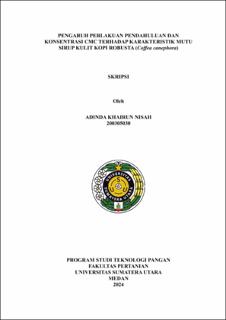| dc.description.abstract | Syrup is a food product made from a concentrated sugar solution with a
minimum sugar content of 65%, combined with food additives, and categorized as
a ready-to-drink beverage. The use of robusta coffee husks aims to utilize their
natural antioxidant content in syrup beverages, while CMC is employed as a
thickening agent, stabilizer, and to inhibit the reduction of antioxidant activity. This
study was aimed to determine the effects of pre-treatment of robusta coffee husks,
CMC concentration, and their interactions on the quality characteristics of robusta
coffee husk syrup. The method used was a completely randomized factorial design
(CRD) with two factors: pre-treatment (without blanching, hot water blanching,
and steam blanching) and CMC concentration (0.05%, 0.10%, and 0.15%).
The analyses conducted were color index, pH, total dissolved solids,
viscosity, antioxidant activity, total plate count, ash content, and organoleptic
evaluation. The results showed that pre-treatment, CMC concentration, and their
interactions significantly affected the quality characteristics of robusta coffee husk
syrup. The syrup with the best quality characteristics was obtained from treatment
A3C2 (steam blanching and 0.10% CMC concentration), with the following
analytical results: color index 50.58 °Hue, pH 3.58, total soluble solids 72.71 °Brix,
viscosity 68.73 cP, antioxidant activity (IC50) 175.51 μL/mL, total plate count 3.11
x 10² CFU/mL, ash content 0,03%, hedonic evaluation for color: 4,31 (like), aroma
4,24 (like), taste 4,38 (like), syrup beverage taste 4,65 (highly liked), thickness 4,72
(highly liked), and overall 4,91 (highly liked). | en_US |


